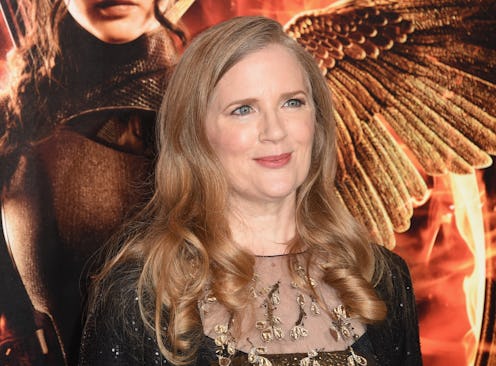On the evening of May 25, publishing professionals and authors gathered at Capitale in Manhattan to celebrate the legacy and impact of The Hunger Games author Suzanne Collins at the 24th Annual Authors Guild Dinner.
Collins received the Award for Distinguished Service to the Literary Community for her contributions to young adult literatures, most notably as the author of the Hunger Games series. According to the Authors Guild, Collins has "demonstrated the power of children's literature by tackling difficult potential and social issues in her immensely popular books."
In addition to Collins, acclaimed children's and young adult novelists David Levithan (author of Boy Meets Boy ), Rick Riordan (author of the Percy Jackson and the Olympians series), and Norton Juster (author of The Phantom Tollbooth) also gave remarks about YA literature's unique power to disrupt the status quo, introduce difficult topics to kids, and change the lives of children.
Here are eight quotes from Collins, Levithan, Riordan, and Juster about the resounding power of young adult literature:
"All of these outings were part of a larger education in what is known as 'just war theory', which examines the morality of going to war — under what circumstances it can be deemed justifiable and the morality of conduct within it. Do I think this can be confusing for children?Sometimes. ... My feeling about 'just war theory' is that it's much less about understanding the nuts and bolts of battle than it is about examining ethical dilemmas. When are we as human beings capable of understanding this? My position is: much younger than we are given credit for. That's my position, and in the words of Damon Runyon, 'a story goes with it.'"
— Suzanne Collins
"I write for kids because childhood is where the foundation of our thinking is laid, and I want to be a part of that. I write for them because... I think the concepts of war — the realities, the politics, the ethical ambiguities — are introduced too late to children. These stories are written with the hope that if the whole idea of war were presented to people at an earlier age, we would have better dialogues going on about it. We would have a fuller understanding of its cost, and we would possibly find more nonviolent methods of conflict resolution as we head into the future."
— Suzanne Collins
"The people who challenge Suzanne's [Collins] work dismiss it as being about 'kids killing kids.' And they say this as if we don't train teenagers to fight other teenagers. As if society hasn't been rigged to have our youth fight our dirtiest battles. Children dying in books is not a problem. Children dying in real life is a problem, and sometimes it takes books to point that out. That is why we need the truth tellers who are also storytellers and the storytellers who are also truth tellers."
— David Levithan
"Suzanne knows — as all children's and YA authors know, including the ones you will hear tonight — the only way out of entropy and discord and despair is to figure it out. That's what her books, for all ages, do. They help us figure it out. And they do that by telling the truth."
— David Levithan
"Why is writing for kids important? I don't really have to look very far to see the reason. In this room, there are a lot of people who have shaped my life and the life of my children."
— Rick Riordan
"Teachers and books are a lot alike. It only takes one — the right one at the right time — to change a life."
— Rich Riordan
"Most of our children are very seriously underestimated in what they can understand and what they feel like and how they connect with us."
— Norton Juster
"The best way to sum it up is a little quote I found, quite by accident, by W.H. Auden, a poet. He said: 'There are some good books that are only adults, because their comprehension presupposes adult experiences, but there are no good books which are only for children.' I believe that very, very much."
— Norton Juster
